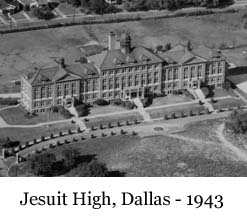
I always laugh when people deprecate Catholicism as mindless superstition, because I know better from direct experience as a product of four years of Catholic high school. I started out at Jesuit High in Dallas in 1961. Mr. Joubert was my home room, religion, and English teacher. A lot of French names - it was the New Orleans Province after all, not missionaries from Chicago (like my grade school, St. Luke's in Irving). So a tip of the hat to Mr. Vavasseur, my sophomore geometry teacher, a tall, skinny, kind and intelligent man who knew and valued his subject and also knew how to transmit intellectual excitement. He was an important milestone in my mathematical education, especially considering that geometry is where students first encounter the axiomatic method and proofs, the cornerstones of modern mathematics. Between proofs, Mr Vavasseur regaled us with stories of how geometry had been the canonical science for two thousand years, even people like Spinoza modeling their philosophical speculations on Euclid. He quite rightly mentioned Giovanni Girolamo Saccheri, S. J., who foreshadowed non-Euclidean geometry. He was hell on wheels when crossed though; I remember him thundering more than once, "I'll be in Room 214 after school, Jones, be there" (emphasis on the last two words).